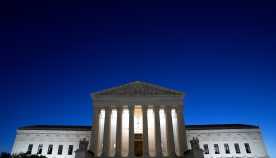About Us


This year marks the 50th anniversary of enactment of the Employee Retirement Income Security Act of 1974 (ERISA), 29 U.S.C. §§ 1001 et seq. In response to concerns that private pension plans were being mismanaged, ERISA was enacted in 1974 to set minimum standards for retirement plans. ERISA protects workers’ employment retirement savings by imposing fiduciary obligations on retirement plan sponsors and administrators. As we approach half a century of ERISA protections for retirees, federal courts disagree on what plaintiffs need to plead in their complaints against retirement account administrators to allege ERISA violations. This growing circuit split increases the likelihood that the Supreme Court will grant certiorari in one or more cases to settle this important question for plaintiffs who accuse their retirement plan fiduciaries of self-dealing.
Fiduciaries under ERISA are responsible for operating the retirement plans solely in the interest of participants and beneficiaries. Fiduciaries have dual duties of prudence—acting with care, skill, and necessary prudence—and loyalty—acting solely in the interest of the participants and beneficiaries of the plan. 29 U.S.C. § 1104(a)(1)(B), 1104(a)(1)(A)(i)–(ii). Fiduciaries are required to avoid conflicts of interest, may not engage in self-dealing, and are prohibited from receiving any consideration or compensation for any investment transaction involving the assets of the plan absent an exemption from the U.S. Department of Labor.
Section 1106 of ERISA “supplements the fiduciary’s general duty of loyalty to the plan’s beneficiaries” by categorically barring certain transactions deemed likely to injure the retirement plan. Harris Trust & Savings Bank v. Salomon Smith Barney, Inc., 530 U.S. 238 (2000). These barred transactions are known as “prohibited transactions.” 29 U.S.C. § 1106. With a few exceptions, subsection 1106(a) provides that “(1) A fiduciary with respect to a plan shall not cause the plan to engage in a transaction, if he knows or should know that such transaction constitutes a direct or indirect … (C) furnishing of goods, services, or facilities between the plan and a party in interest.” Id.
§ 1106(a). A “party in interest” is “a person providing services to such plan.” Id. § 1002(14)(B). ERISA permits some otherwise-prohibited transactions. Notably, section 1106(a)(1) permits “[c]ontracting or making reasonable arrangements with a party in interest for … services necessary for the establishment or operation of the plan, if no more than reasonable compensation is paid therefore.” Id. § 1108(b)(2). This means that retirement plan fiduciaries can contract with people paid to administer the plan as long as their compensation is “reasonable.”
Courts of appeals have conflicting interpretations of what a plaintiff needs to allege to establish that a payment by a retirement plan to a third party providing it with recordkeeping, administrative, or investment management services amounts to a prohibited transaction under ERISA.
In Braden v. Wal-Mart Stores, Inc., 588 F.3d 585 (8th Cir. 2009), the plaintiff alleged that the revenue sharing payments made by Wal-Mart’s retirement plan to its trustee, Merrill Lynch, were kickbacks in exchange for inclusion of certain funds in the plan rather than reasonable compensation for actual services performed. The Eighth Circuit held that these allegations were sufficient to establish a claim for breach of fiduciary duty under section 1106(a)(1)(C). Braden, 588 F.3d at 598. The court explained that the plaintiff “does not bear the burden of pleading facts showing that the revenue sharing payments were unreasonable in proportion to the services rendered” because the burden to show that “no more than reasonable compensation was paid for Merrill Lynch’s services” under section 1108(b)(2) shifts to Wal-Mart. Id. at 600-01. The court rejected the contention that unless a plaintiff is required to plead facts plausibly suggesting a transaction is not exempted under section 1108, ERISA fiduciaries will be forced to defend the reasonableness of every service provider transaction. Id. at 601-02.
Similarly, in Bugielski v. AT&T Services, Inc., 76 F.4th 894 (9th Cir. 2023), the Ninth Circuit embraced a “literal reading” of ERISA and rejected the contention that section 1106(a)(1)(C)’s prohibited transactions exclude arms-length transactions between a plan and a service provider. Bugielski, 76 F.4th at 907, 901. The court explained: “We are particularly reluctant to adopt an atextual interpretation of section 406 because ERISA is an enormously complex and detailed statute, that is the product of a decade of congressional study of the Nation’s private employee benefit system.” Id. at 901 (internal citations and quotations omitted). However, because the appeal arose from the grant of summary judgment, the Ninth Circuit did not address whether section 1108 exemptions are treated as affirmative defenses at the pleading stage.
In contrast, in Cunningham v. Cornell University, 86 F.4th 961 (2d Cir. 2023), the Second Circuit adopted a restrictive view of section 1106(a)(1)(C). Here, the plaintiffs alleged that Cornell engaged in prohibited transactions by causing its retirement plan to pay fees to a third party for recordkeeping and administrative services. Cunningham, 86 F.4th at 974-75. The court rejected the Eighth Circuit’s holding in Braden that, at the pleading stage, section 1108(b)(2) exemptions should be merely understood as affirmative defenses to the conduct forbidden in section 1106(a)(1). The court held that “to plead a violation of section 1106(a)(1)(C), a complaint must plausibly allege that a fiduciary has caused the plan to engage in a transaction that constitutes the ‘furnishing of … services … between the plan and a party in interest’ where that transaction was unnecessary or involved unreasonable compensation.” Id. at 975 (citations omitted).
The Second Circuit’s decision in Cunningham is in line with the Seventh and Tenth Circuits, both of which have declined to read section 1106(a)(1)(C) expansively. In one case, the Seventh Circuit held that a prohibited-transactions claim must plead that the transaction looks like self-dealing as opposed to routine payments for plan services. Albert v. Oshkosh Corp., 47 F.4th 570, 584-85 (7th Cir. 2022). In the other case, the Tenth Circuit held that a prohibited transactions claim must plead the existence of a prior relationship between the fiduciary and the service provider to make the provider a party in interest. Ramos v. Banner Health, 1 F.4th 769, 787 (10th Cir. 2021).
In light of the growing circuit split on this issue, the Supreme Court is likely to grant a petition for certiorari to address the pleading standard for alleging a breach of fiduciary duty under section 1106(a)(1)(C) of ERISA.
Stefan Shaibani, SShaibani@aarp.org
Julie Nepveu, JNepvue@aarp.org
View the Full Supreme Court Preview

















